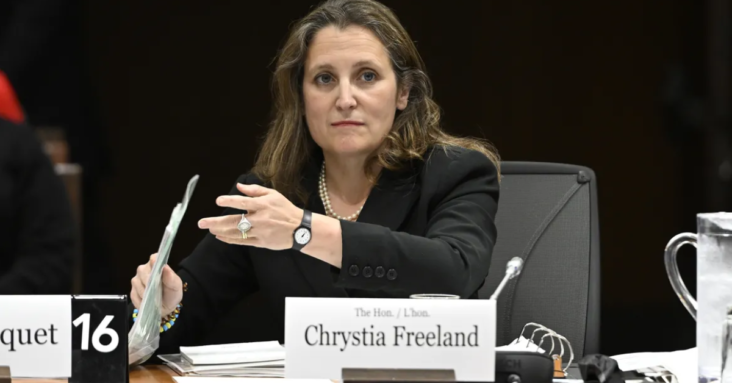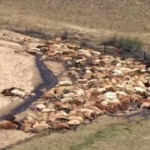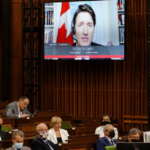
Deputy Prime Minister and Minister of Finance Chrystia Freeland takes part in the Special Joint Committee on the Declaration of Emergency surrounding the government’s use of the Emergencies Act in Ottawa on June 14.
Finance Minister Chrystia Freeland was repeatedly accused of providing evasive responses Tuesday evening as she appeared before a special joint committee of MPs and senators reviewing the government’s first-ever use of the powers contained in the federal Emergencies Act.
Conservative, Bloc Québécois and NDP MPs all expressed strong frustration throughout Ms. Freeland’s 1½-hour appearance.
“Everybody watching this committee right now can see that you’re just refusing to answer very basic questions. It’s to the point of almost being contemptible,” said NDP MP Matthew Green, whose party is part of a parliamentary co-operation agreement with the governing minority Liberal government.
“I’m not sure it’s very appropriate to call a fellow MP contemptible,” Ms. Freeland countered. (Mr. Green later apologized, saying he meant to say contemptuous.)
It was a common refrain. At one point, Bloc MP Rhéal Fortin accused Ms. Freeland of “wasting our time,” while Conservative MPs repeatedly pointed out that Ms. Freeland, who is also Deputy Prime Minister, was not answering direct questions.
The Act was invoked on Feb. 14 in response to a weeks-long protest in downtown Ottawa that saw large trucks clog city streets immediately south of Parliament Hill. That month also saw similar protests at various border crossings in Canada, causing costly trade disruptions. The protesters were primarily opposed to government restrictions related to the COVID-19 pandemic.
A massive police operation cleared the Ottawa streets four days after the Act was invoked and the powers were rescinded on Feb. 23.
The opposition parties frequently asked the minister to provide economic data or advice from the public service that justified the government’s decision to invoke the Act.
The minister instead referenced the strong concerns expressed at the time by Canadian business leaders. Ms. Freeland said border blockades by protesters opposed to pandemic restrictions earlier this year risked causing permanent harm to Canada’s integrated trading relationship with the United States.
“I was very gravely concerned about the damage to our trading relationship with the United States and our reputation as a reliable partner,” she said. The minister said Canadian business leaders were frequently warning her about the economic damage of the blockades and U.S. politicians were increasingly pointing to the disruptions and calling for less cross-border trade.
“These blockades, this illegal occupation, was the perfect event designed to make it easier for American protectionists to close their market to us,” she said.
Invoking the Act gave police the powers to designate specific areas, such as downtown Ottawa and some border crossings, as prohibited areas where protesters could face arrest. However one of the most contentious uses of special powers was a move to freeze the bank accounts of individuals who were involved with the protests.
Ms. Freeland said Tuesday that the emergency measures led to the freezing of approximately 280 financial products, including bank accounts, credit cards and lines of credit, for a total value of about $8-million. The minister said a further 170 bitcoin addresses were identified and shared with virtual currency exchangers. Accounts were frozen based on a list of names compiled by the RCMP. The Canadian Bankers Association has said a “small number” of additional accounts were frozen based on the banks’ own reviews.
The RCMP said in February the freezing of accounts was used to encourage protesters to leave the illegal protests. RCMP assistant commissioner Michel Arcand told the Commons finance committee in March that the power had an immediate impact, causing some people to leave out of fear that their accounts would be frozen.
The biggest political issue to date during the committee’s review has been over Public Safety Minister Marco Mendicino’s past claim that the Act was invoked based on advice from law enforcement. Several police forces have since testified that they did not specifically urge the government to invoke the Act. Mr. Mendicino’s deputy minister, Rob Stewart, told the special committee last week that the minister has been “misunderstood” and that police asked for the tools that were contained in the Act.
The joint committee study is required according to accountability provisions in the Emergencies Act, which became law in 1988. The Act replaced the War Measures Act, which was enacted in 1914 and had been used just three times in Canadian history: during the two world wars and during the 1970 October Crisis involving terrorist attacks in Quebec.
In addition to the joint committee study, the Act calls for a separate inquiry to review the matter and issue a report within 360 days of the revocation of the declaration of emergency.
Prime Minister Justin Trudeau announced in April that Justice Paul Rouleau will be the Commissioner of the Public Order Emergency Commission.



